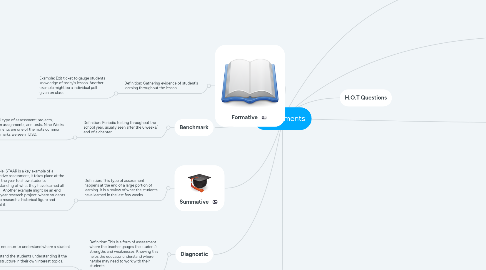
1. Formative
1.1. Definition: Gathering evidence of student's learning throughout the lesson
1.1.1. Example: Exit ticket to gauge students knowledge of today's lesson. Another example might be a individual poll given on class
2. Performance
2.1. Definition: This is when the teacher asks the student to perform a task to be assessed.
2.1.1. Example: A teacher may ask students to perform a play to show their understanding of the elements of drama. Another example may be asking student to group up and create a summarization presentation about a specific book.
3. Summative
3.1. Definition: This type of assessment happens at the end of a large portion of learning. It is a review of what the students have learned in the last few weeks.
3.1.1. Example: STAAR is a key example of a summative assessment, it takes place at the end of the year to show students understanding of what they have learned all year. Another example might be an end of the year research project, where students have to research a historical figure and present it.
4. Benchmark
4.1. Definition: Periodic testing throughout the school year, usually seen after the 6 weeks/ end of a chapter.
4.1.1. Formal type of assessment; projects, written assignments, and tests. Nine Weeks assesments are one of the mots common benchmarks we see in LISD.
5. Diagnostic
5.1. Definition: This is a form of assessment where the teacher gauges the student's strengths and weaknesses. Knowing this helps the educator understand where he/she may need to work with their students.
5.1.1. Examples: Running records allow for the educator to understand where a student struggles with their reading. Journal Entries help the educator understand the students understanding if the alphabetic principal as well as sentence structure in their own interest topics.
